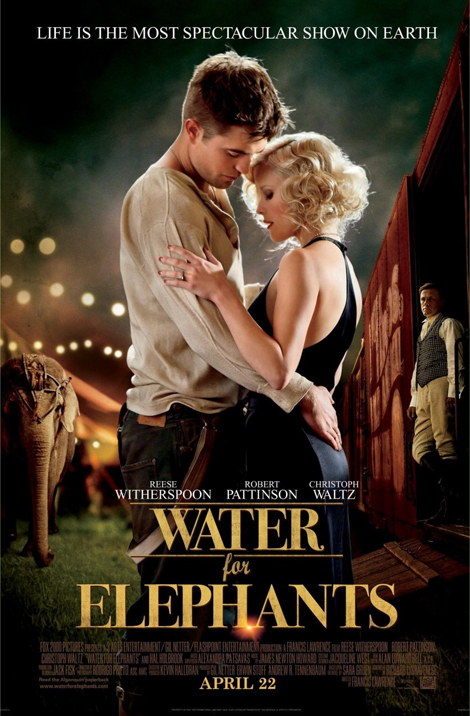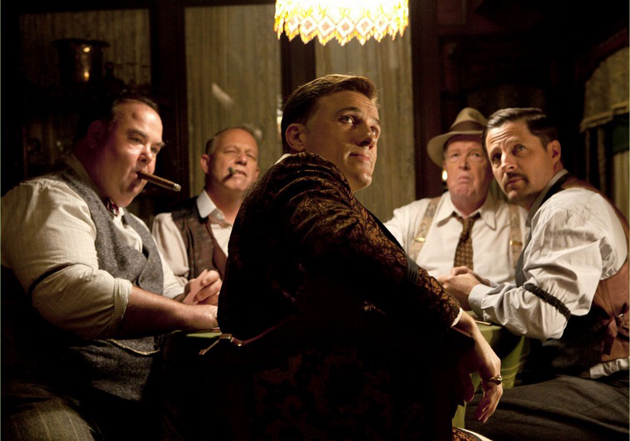The Shell Game of Corrupted Government Exposed
Water for Elephants
 Romantic Great Depression Period Piece is a Fine Treatment of that Era
Romantic Great Depression Period Piece is a Fine Treatment of that Era The exposition of the hard edges of a bad time, in an otherwise thoughtful world, is the best of "Water for Elephants." The back
 story of a chaotic, but touching romance of two fated lovers is secondary to that primary tale of the economic perils of those tough times, and the human collateral left in the wake of The Great Depression's destructive power.
story of a chaotic, but touching romance of two fated lovers is secondary to that primary tale of the economic perils of those tough times, and the human collateral left in the wake of The Great Depression's destructive power.
If one ever wanted to know the intrinsic truth of Franklin Delano Roosevelt's statement in his 1933 inauguration speech, "The only thing we have to fear is fear itself," one need only see this film, based on the popular novel by Sara Gruen, so completely employing that Great Depression as its emotional and picturesque backdrop. It is the obvious blame in every instance, by word or image, that pivots the story toward its conclusion. These are frightening times, with the only safety-net being the ingenuity of ambitious men and women, who provided for themselves. The Great Depression is the primary character of this film, and it begs for the audience to see for themselves a time that most of us have never known.
 Christoph Waltz, as August, was always at the center of every discussion and every scene, whether he was in it or not: Above and below.
Christoph Waltz, as August, was always at the center of every discussion and every scene, whether he was in it or not: Above and below.

The secondary character in the film is the character of August, the owner of the Benzini Brothers Circus (Uncle Al, the circus owner in the novel, is not mentioned in this movie), played by Christoph Waltz. He is the fulcrum from which all elements of this story find direction. His circus gives purpose to all of it workers and players of acts, and his irrepressible, and often, irresponsible will is the dominant theme that motivates the characters to find a bearing for their ultimate purpose. It is August, who is married to Marlena, the female lead played by Reese Witherspoon. It is August, who gives Jacob Jankowski, the male lead and the film's protagonist, played by Robert Pattinson, a job as the Circus's Veterinarian. It is August, who locates and purchases Rosie, the 53 year old Asian Elephant, who becomes the feature of all the circus's acts, and later the victim of August's increasingly abusive tendencies.
 Robert Pattinson, as Jacob Jankowski, joins the circus as a refuge from economic malaise of The Great Depression, where he finds his calling as Rosie's keeper: Above. Rosie, the Asian Elephant, learned her commands in Polish so Mr. Jankowski, first generation naturalized American, serendipitously finds he can communicate with the gentle beast: Below.
Robert Pattinson, as Jacob Jankowski, joins the circus as a refuge from economic malaise of The Great Depression, where he finds his calling as Rosie's keeper: Above. Rosie, the Asian Elephant, learned her commands in Polish so Mr. Jankowski, first generation naturalized American, serendipitously finds he can communicate with the gentle beast: Below. 
There is a charming, charismatic side to August, who is deftly portrayed by the enigmatic Waltz. He lures you in, makes the argument for the benevolent dictator, and then by the very nature of a paranoid landlord of souls, he destroys all that orbits his sphere of daunting influence. His character is just trying to manage all within his orbit in these trying times, and obviously because of insurmountable character flaws, he manages quite badly.
 Reese Witherspoon, as Marlena, was August's lead act and the apple of his eye, but one must always question: Can a narcissistic brute really be capable of love?
Reese Witherspoon, as Marlena, was August's lead act and the apple of his eye, but one must always question: Can a narcissistic brute really be capable of love?

Reese Witherspoon is well cast as the sultry lead act, Marlena, of the struggling circus, and as is the strength of her talent, breaths life into that role. Robert Pattinson is cast as the romantic lead, Jacob, for his smoldering persona so well evidenced in the juvenile Twilight series. For some reason, I believe there is a fine actor locked up in this handsome young man. I saw glimpses of it in Director Francis Lawrence's rendering of the Richard LaGravenese screenplay of the Sara Gruen novel. I'm just not convinced, he wasn't hired to play the affable circus vet mostly for his allure to those folks who live for romance as if it was, sadly, their intellectual life force.

Remarkably, and irrespective of the romantic innuendo, it is the fine story within Sara Gruen's period piece that carries this film. Her treatment of the Great Depression and how the organic symbiosis of a living circus found, or did not find, the economic machinations to assimilate within that desperate decade of the 1930's is the real story here that is worth the price of admission. Director Lawrence, and Cinematographer Rodrigo Prieto presented an excellent picture of these troubled times, with the supporting characters, too numerous to mention, playing their parts well enough to suspend all audience disbelief.

People in the 1930's saved their nickels and dimes to plop down that spare change for the price of admission to savor the new medium of celluloid, and escape that hard scrabble world. I can only pray that history does not repeat itself, but if it does; this film, in its 120 minutes of runtime, would be a perfect component within the genre of the romantic drama that was a staple during The Great Depression. Sometimes it is good to forget the days that ensnare us all, but ultimately it is always best that we remember, so that we may seek the solution.
"Water for Elephants" gave us a remembrance, a glance into a time when fear reigned, and love was found in trickles in odd places.
Rated R. Released in theaters April 22, 2011.
This article provided courtesy of our sister site: Better Angels Now
| Vanishing on 7th Street | Film Reviews, Movie Reviews, The Arts | White Hip-Hop has got the listing on Whole Foods |






















